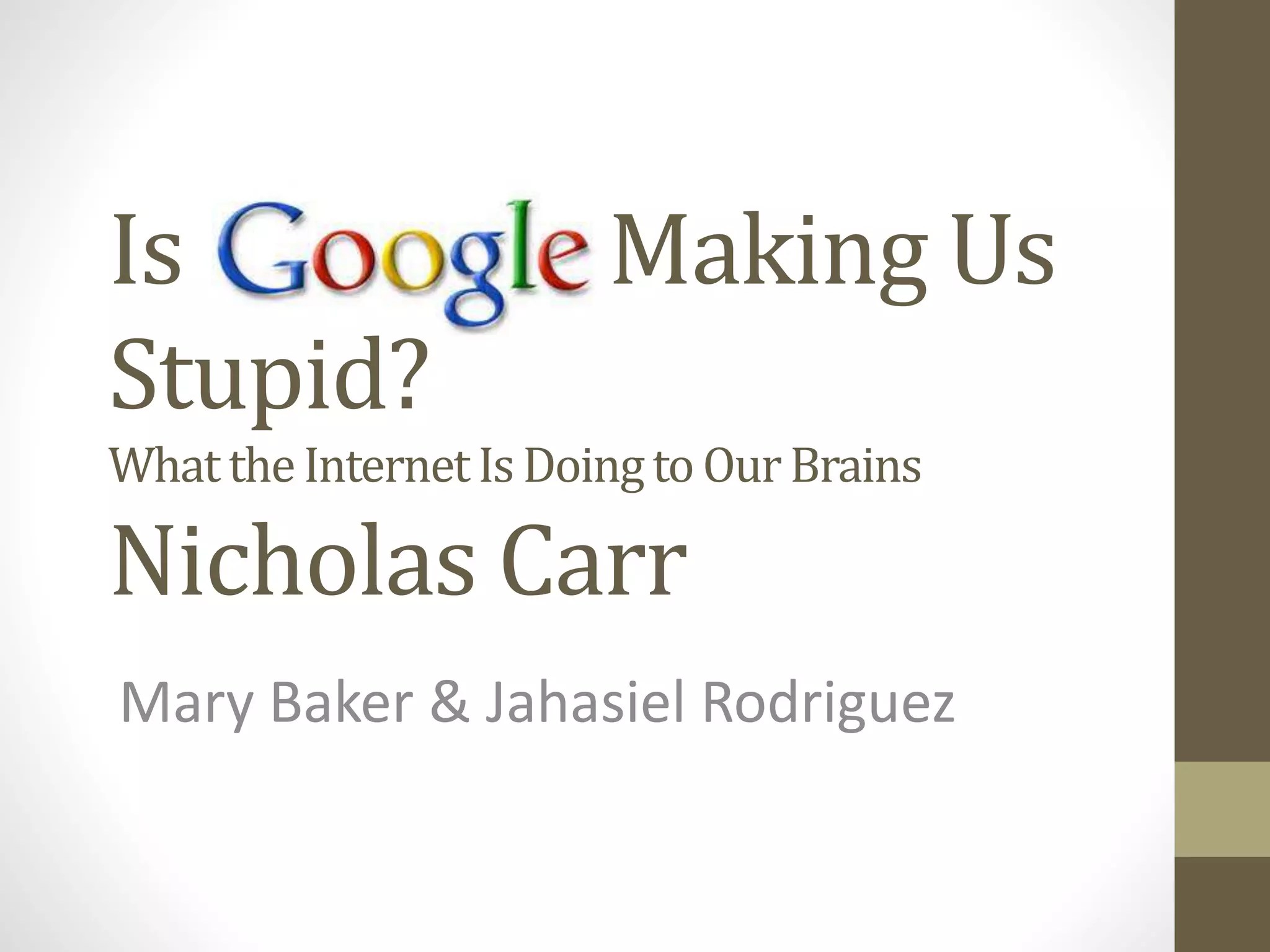Nicholas Carr’s 2008 Atlantic article, “Is Google Making Us Stupid?” ignited a crucial conversation about the internet’s impact on our minds. He argued that the internet, with Google as its prime example, was altering our cognitive processes, possibly at the expense of deep, focused thinking. This article revisits Carr’s core arguments, analyzing their relevance in today’s world of ubiquitous smartphones, pervasive social media, and rapidly advancing AI.
Carr’s Core Argument: Rewiring Our Brains?
Carr’s central claim was that the internet, with its rapid-fire delivery of information and constant distractions, was rewiring our brains, similar to how the invention of the clock altered our perception of time. He argued that the internet encourages us to skim and scan, prioritizing quick information gathering over deep reading and contemplation. This shift, he suggested, may be diminishing our capacity for sustained attention and critical analysis. [https://www.lolaapp.com/atticus-finch-lawyer-quotes] offers a glimpse into a legal mind capable of deep thought and analysis, a quality Carr worried might be eroded by the internet’s influence. He recounted his personal struggles with maintaining concentration while reading, a phenomenon he attributed to the internet’s reshaping of his cognitive habits.
Evidence and Counterarguments: A Balanced Perspective
To support his argument, Carr cited his own changing reading habits, drew parallels to historical technological shifts like the printing press and the clock, and pointed to early neuroscience research on neuroplasticity—the brain’s ability to reorganize itself. He suggested that the internet’s constant barrage of information may be physically altering our neural pathways.
However, critics argued that Carr was overly pessimistic and technologically deterministic, overstating the internet’s power to shape our minds while neglecting its vast potential for learning and knowledge sharing. They maintained that technology is merely a tool, and its impact depends entirely on how we choose to use it.
The Internet’s Impact Today: Amplified Concerns
Fast forward to the present, and Carr’s concerns appear even more pertinent. The rise of social media, the ubiquity of smartphones, and the emergence of AI have intensified anxieties about technology’s influence on our cognitive abilities. Are personalized algorithms creating echo chambers, narrowing our perspectives instead of broadening them? Do AI chatbots like ChatGPT discourage critical thinking by providing readily available answers? The pervasiveness of these technologies adds further complexity to the ongoing debate.
Neuroplasticity Revisited: A Double-Edged Sword
Carr’s focus on neuroplasticity also deserves renewed attention. While the brain’s adaptability is inherently positive, enabling us to learn and adapt to new situations, the constant influx of digital information may have unintended consequences. Ongoing research is exploring whether digital media enhances certain cognitive skills while diminishing others. Are we becoming more adept at processing information quickly while losing our ability for deep, focused thought? For instance, while we might quickly access information about a character like [https://www.lolaapp.com/katniss-everdeen-naked], are we truly engaging with the complexities of her character and the nuances of her story in a meaningful way? The answers likely lie somewhere in the nuanced interplay between these positive and negative influences.
The Uncertain Future: A Call for Critical Engagement
The long-term cognitive impacts of digital media remain uncertain. Some experts believe the internet enhances certain cognitive skills, while others express concern about its potential long-term effects. The impact probably varies depending on individual usage patterns, age, and other factors. The science is still evolving, and further research is crucial to understanding the complex relationship between our brains and the digital tools we use.
Carr’s work serves as a crucial reminder of the importance of critically evaluating our relationship with technology. It encourages us to consider the potential consequences of our digital habits and actively cultivate practices that promote deep thinking, critical analysis, and a balanced perspective. Ongoing research, continued discussion, and mindful engagement with technology are essential for navigating the evolving digital landscape. We must ask ourselves: are we using technology to enhance our cognitive abilities or allowing it to subtly erode our capacity for focused thought and critical engagement?
- Jerry McSorley’s Post-Divorce Life: New Beginnings - July 16, 2025
- The Rise and Fall of the New Haven Nighthawks: A Minor League Hockey Legacy - July 16, 2025
- Unlock Jerry McSorley’s Career Highlights: Eye Tax Inc.’s Solar Success - July 16, 2025

















1 thought on “Is Google Making Us Stupid? Nicholas Carr’s Enduring Question in the Age of AI”
Comments are closed.